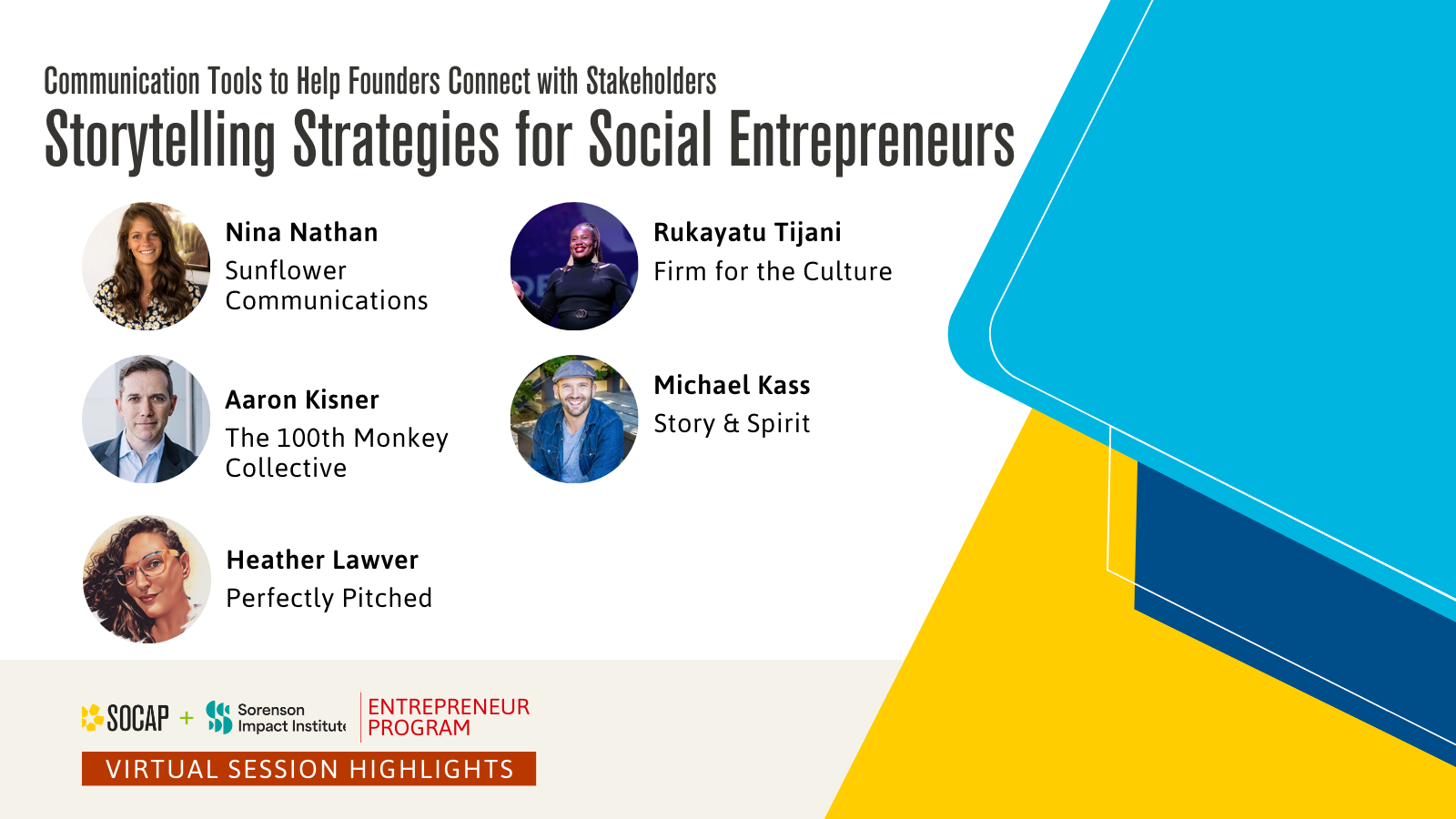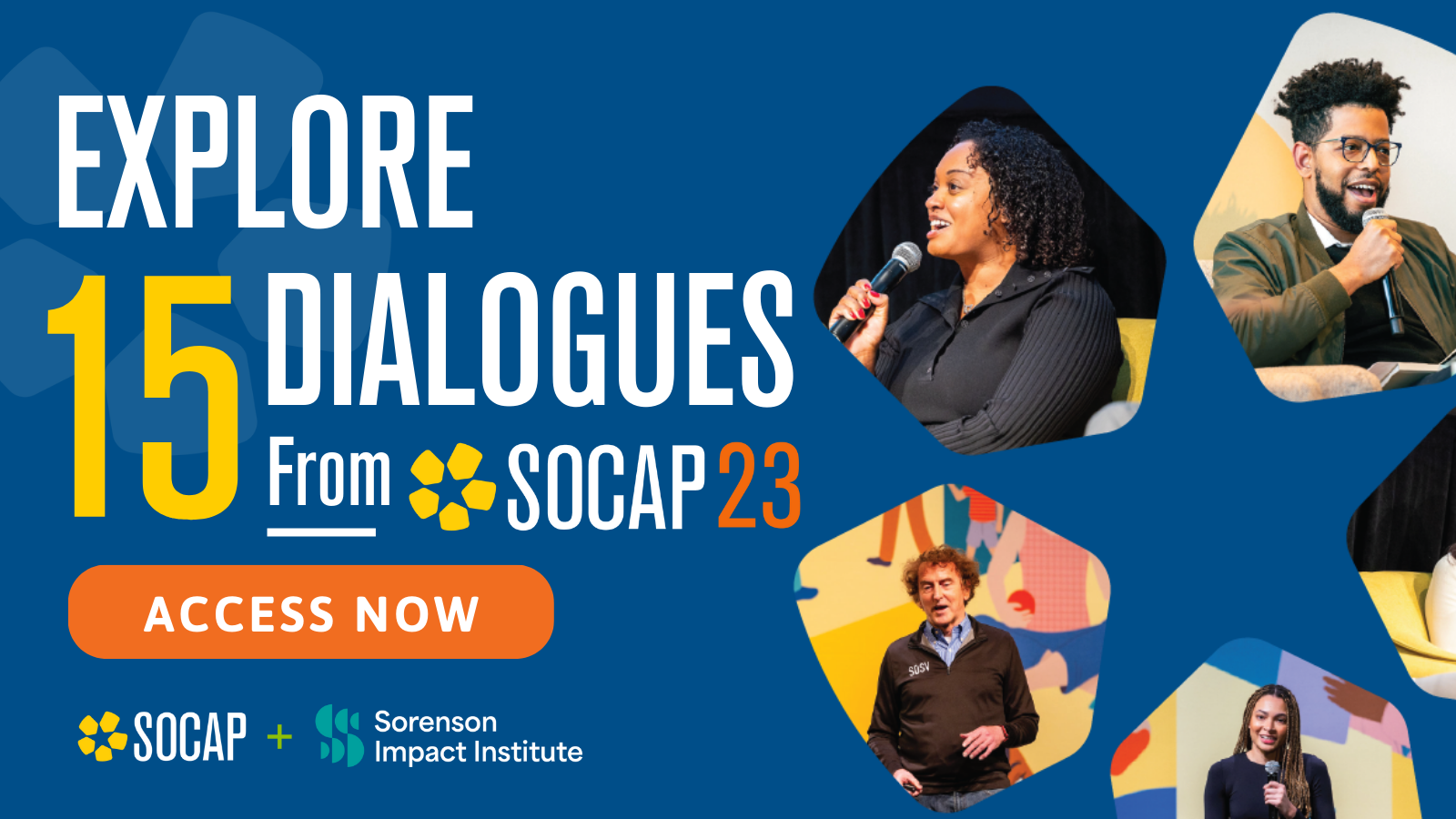Communication Tools to Help Founders Connect with Stakeholders
As they launch and build social enterprises, founders also seek to measure and manage their business impact. This year’s SOCAP23 Entrepreneur Program includes six monthly strategy tracks — including September sessions on storytelling, marketing, and communication strategies — to help founders enhance their impact and develop a supportive framework for their businesses.
The virtual sessions for founders are facilitated by a variety of subject matter experts. We’re grateful for the knowledge, time, and guidance they are sharing with the founders and the broader SOCAP community.
At SOCAP23, you can hear from the SOCAP23 Entrepreneur Program cohort when they present on stage about the unique challenges their companies are addressing. They’ll also be actively connected to funders through deal rooms. Register now to join them October 23-25 at Yerba Buena Center for the Arts in San Francisco.
Find highlights and takeaways below from the September sessions, which provided tips on how founders can use storytelling, marketing, and communications to build their businesses. Previous sessions focused on impact measurement in August, innovative financing and self-advocacy in July, business growth tools and models in June, team leadership and culture development in May, and holistic wellness in April.
Building a Communication Calendar and Strategy
Presented by Nina Nathan of Sunflower Communications, an agency that works with nonprofits and impact-driven businesses. Sunflower Communications specializes in amplifying the impact of purpose-led companies through social media strategy, content creation, management, and newsletters.
Takeaways and highlights:
- Storytelling is an important communication tool. Impact professionals need a mindset shift when they think about amplifying their message on social media. You don’t have to be a social media expert, but you DO need to become an expert at telling your story.
- Regular social media platform audits can help you create appropriate messages for each channel and build trust with your audience.
- Language, graphics, and other content elements should be created with your target audience in mind. Consider their age, location, and other factors.
Leveraging Intellectual Property for Social Impact and Revenue Generation
Presented by Rukayatu Tijani of Firm for the Culture, an intellectual property and brand licensing law firm that partners with founders and companies seeking to build revenue-generating social impact. Firm for the Culture offers trademark and licensing services and transparent flat-fee pricing while also leveraging innovative technology and practices.
Takeaways and highlights:
- There are many ways to use intellectual property to grow and sustain a business and protect the brand.
- Trademarks allow a company to protect specific names, logos, and symbols pertaining to their products or business brand.
- Copyright gives protection to its owner by providing a bundle of rights around copying, displaying, printing, and distributing work. It also can be used to generate revenue for a business.
- Patents are typically used for inventions and give the owner the exclusive right to the patented technology or invention.
Storytelling Training Through Life Story
Presented by Aaron Kisner of The 100th Monkey Collective, which taps into the power of stories to change minds. The 100th Monkey Collective finds, crafts, and communicates compelling stories with clients.
Takeaways and highlights:
- Stories aren’t just for entertainment; they are a function of survival. They help strengthen social ties and create security within communities.
- Every human being tells stories, but telling better and more strategic stories is a skill you can improve. Stories are how we make sense of our actions and the world around us.
- Businesses can use stories to help people better understand and support a company’s work and impact. When we tell stories, we are asking others to accept our perspectives and experiences.
The Power of Story for Greater Connection
Presented by Michael Kass of Story & Spirit, which works with organizations and individuals to weave stories for greater connection. Story & Spirit brings together elements from coaching, a decade-plus of breathwork facilitation, storytelling, and Earth-based practices to support impact-minded clients.
Takeaways and highlights:
- How we present ourselves and share stories can help us connect with others.
- Storytelling is a building block of community. It helps us learn, connect, and shape our interactions.
- Sharing stories before data can help us build trust with others. Before anyone will be convinced by data, we have to connect with them as humans.
The Art of Pitching: How I Learned to Stop Worrying and Love PowerPoint
Presented by Heather Lawver of Perfectly Pitched, which combines storytelling, design, and changemaking. Perfectly Pitched works with social entrepreneurs to create pitch decks that distill their identities through engaging storytelling and design.
Takeaways and highlights:
- Every startup needs a pitch deck to share externally with potential investors or other partners.
- Three check-in questions can be helpful before pitch presentations: What is my pitch goal? Who is my audience? How can I connect?
- Investors need to understand and believe that you and your team can make your goals and impact a reality. Sharing authentic stories can help create empathy and build relationships.





